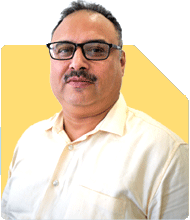Baqar Iftikhar Naqvi | Answer |Ask -Follow
Start-up Mentor - Answered on Sep 08, 2023

I was in Dubai and Qatar and working in various sections for 25 years in the banking industry. Last 4 years I also ventured in digital marketing and now also learning prompt engineering. I got good knowledge in online marketing but nothing is working out. I am still not able to decide what should I start can you provide me few suggestions
You may like to see similar questions and answers below
Krishna Kumar | Answer |Ask -Follow
Workplace Expert - Answered on Mar 14, 2024
Krishna Kumar | Answer |Ask -Follow
Workplace Expert - Answered on May 07, 2024
Maxim Emmanuel | Answer |Ask -Follow
Soft Skills Trainer - Answered on May 23, 2024
Ramalingam Kalirajan |10893 Answers |Ask -Follow
Mutual Funds, Financial Planning Expert - Answered on Dec 15, 2025
Ramalingam Kalirajan |10893 Answers |Ask -Follow
Mutual Funds, Financial Planning Expert - Answered on Dec 15, 2025
Radheshyam Zanwar |6746 Answers |Ask -Follow
MHT-CET, IIT-JEE, NEET-UG Expert - Answered on Dec 15, 2025
Ramalingam Kalirajan |10893 Answers |Ask -Follow
Mutual Funds, Financial Planning Expert - Answered on Dec 15, 2025
Ramalingam Kalirajan |10893 Answers |Ask -Follow
Mutual Funds, Financial Planning Expert - Answered on Dec 15, 2025
Ramalingam Kalirajan |10893 Answers |Ask -Follow
Mutual Funds, Financial Planning Expert - Answered on Dec 15, 2025
Samraat Jadhav |2508 Answers |Ask -Follow
Stock Market Expert - Answered on Dec 15, 2025
Ramalingam Kalirajan |10893 Answers |Ask -Follow
Mutual Funds, Financial Planning Expert - Answered on Dec 15, 2025
Reetika Sharma |425 Answers |Ask -Follow
Financial Planner, MF and Insurance Expert - Answered on Dec 15, 2025
Radheshyam Zanwar |6746 Answers |Ask -Follow
MHT-CET, IIT-JEE, NEET-UG Expert - Answered on Dec 15, 2025

























